In a span of 100 days, leaders from around the world will convene in the UAE for the COP28 UN climate conference. Their efforts involve tackling the escalating emergency through negotiations to find solutions for curbing global warming and adapting to a changing climate. These discussions will also decide who bears the financial responsibility for the damages already incurred.
The critical talks will unfold at Expo City Dubai, spanning from November 30 to December 12. Scientists believe that these discussions are a result of a series of extreme events this summer, all of which are connected to climate change.
Wildfires and intense heatwaves have devastated regions across Africa, America, Asia, and Europe. July has earned the distinction of being the hottest month in recorded history. Torrential rain and sudden floods have impacted both China and Scandinavia.
UAE’s Strong Commitment to Climate Action
The UAE’s Minister of Climate Change and Environment, Mariam bint Mohammed Almheiri, has expressed the UAE’s unwavering dedication to championing a future defined by climate stability and the preservation of the environment.
“Today marks the start of a 100-day countdown to the Conference of the Parties events in the UAE. This is a moment we have been looking forward to, as it highlights the UAE’s efforts in tackling climate change on both a national and international scale,” she said in a press release.
“We see COP28 in the UAE as a living testament to our achievements and a hopeful glimpse into the future. It represents a crucial juncture in our commitment to assist humanity in confronting one of its most profound challenges.”
Ms Almheiri added that as the UAE gears up for COP28, its focus “remains on forging a resilient climate and ecological future, collaborating with all stakeholders to amplify our conference’s global goals”.
In preparation for COP28, the Ministry of Climate Change and Environment will also be introducing a wide range of initiatives, according to The National News.
“These endeavours will further our environmental and climate objectives across different sectors. Backed by our visionary leadership, the UAE will host COP28 equipped with a developmental blueprint that emphasises sustainability and reinforces the UAE’s leading position in this crucial domain,” she said.
In July, UN Secretary-General Antonio Guterres declared that the time of global warming had ended and the era of “global heating” had begun. Guterres starkly highlighted the urgency of the issue by mentioning a novel era of ‘global heating,’ which has resulted in the loss of life, imperilled livelihoods, and endangered food supplies this summer due to unprecedented high temperatures.
Scientists agree that the increase in greenhouse gas emissions, primarily driven by the combustion of fossil fuels, is the main cause of the additional heat. “Climate change is here. It is terrifying. And it is just the beginning,” said Guterres, urging countries – especially from the G20 countries, which are responsible for about 80 per cent of emissions – to raise their ambition in tackling the issue.
Preparation for COP28 and Initiatives
Nations agreed to “pursue efforts” to cap temperature increases at 1.5°C above pre-industrial levels through the 2015 Paris Agreement during COP21. Commitments to sustain this objective would be evaluated every five years, termed a “global stocktake.” This process will debut at Cop28, with Denmark and South Africa tasked to facilitate it.
Dr. Sultan Al Jaber, the designated President of COP28, emphasized that the 1.5°C target will serve as the summit’s guiding principle, even though achieving it will be challenging.
In 2022, the UN asserted that there was no viable path to uphold this goal. To make progress, a substantial and rapid transformation of the “electricity supply, industry, transport and buildings sectors, and the food and financial systems” is required, aiming to reduce emissions by 45% to restrict global warming to 1.5°C.
Scientists warn that a 2°C increase would result in severe consequences, and current policies indicate a potential temperature rise of 2.8°C by the century’s end.
“We know we are way off target,” Bob Ward, policy director at the Grantham Institute for Climate Change at the London School of Economics told The National. “It was the same last year and there has been very little progress since. I hope there will be renewed focus on cutting emissions.”
In July, Dr Al Jaber and Simon Stiell, UN Framework Convention on Climate Change executives, stressed the importance of COP28 achieving a significant emission reduction. They emphasized expediting the responsible reduction of fossil fuels and establishing a clean energy system by mid-century.
Jochen Flasbarth from Germany’s Development Ministry highlighted emissions reduction as COP28’s primary focus.
Collaborative Efforts and Key Topics
The UAE has increased its emissions cut goal to 40% this decade, up from 31%. All nations must submit updated pledges, known as nationally determined contributions, by September.
“We want countries to come forward to increase action on emissions,” said Ward. “That is the main game in town. Without that, we could leave Cop28 more depressed than we have been.”
Increasing climate finance to drive the energy transition and aid those most affected by the crisis is crucial. The UAE’s COP28 plan emphasizes finance alongside speeding up the energy transition, prioritizing people, and ensuring inclusivity.
Dr. Al Jaber, UAE’s Minister of Industry and Advanced Technology, and CEO of Adnoc, urges nations to fulfil the $100B annual funding commitment made in Copenhagen in 2009, with Germany and Canada’s assistance. Dr. Al Jaber also advocates financial support for Caribbean nations, who have long faced climate change impacts.
The UAE presidency collaborates with institutions like the World Bank, IMF, and G20 to devise funding strategies.
The summit will address emissions reduction, financing transition, and potentially loss and damage, as well as expanding renewable energy, nuclear power, and carbon-capture tech. Food, rainforests, and health impacts are also key topics.
Dr. Al Jaber will steer lengthy negotiations, often extending the summit due to competing nation’s interests. Maintaining focus is vital for success, although the host’s impact is limited.


